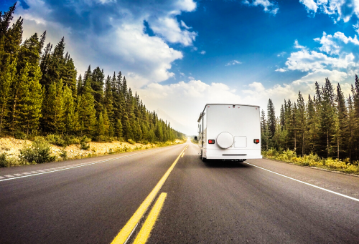News and Updates
Taking a trip with a recreational vehicle or trailer? Don’t make these 6 driving mistakes!
Many Canadians look forward to summer camping trips full of campfires, outdoor games, hikes, swimming and quality time with loved ones. A motorhome, travel trailer or tent trailer is a great way to stay comfortable while enjoying the great outdoors or going on an epic road trip, but driving one isn’t the same as driving a regular car. To ensure that your trip isn’t interrupted by a road accident, avoid these six common mistakes that people make when driving a larger vehicle or towing a trailer.
1. Driving too fast
When driving a large motorhome or towing a trailer, you should drive at a slower speed until you are comfortable with how your vehicle handles. It’s extremely important to follow road signs with speed recommendations, as you will need to turn wider and slower than normal. Motorhomes are more prone to rolling over at high speeds when compared to smaller vehicles, as they have a higher center of gravity and can be dangerously buffeted by winds above 30 km/h. Stick to the speed limit and take care to drive slowly if it’s windy.
2. Not leaving enough safety distance
When driving a motorhome or towing a trailer, you need to factor in extra braking time as you will have more weight behind you. The vehicle will generally be less responsive and agile—when changing lanes or slowing down, give yourself extra time so you can do so safety.
3. Not checking your tires
No one wants to get a flat tire on the highway. Always check your tire pressure and tread wear before taking off to avoid an unexpected flat. Take care not to overload your RV or trailer, as this can put extra pressure on your tires, increasing the risk of a flat. Additionally, keep your speed to 35km/h or less on gravel roads as they can be harder on your tires than pavement.1
4. Not knowing your vehicle’s tow ratings
Make sure you know how much your vehicle can safely tow or carry and be careful not to overload that capacity. Your trailer’s unloaded weight and weigh ratings can be found on its Vehicle Identification Number (VIN) plate, and vehicle towing specifications are found in the owner’s manual. Exceeding your weight limit is against the law and can void your RV or auto insurance if you get into an accident. If you’re not sure if you’ve exceeded your limit, take your loaded motorhome or truck and trailer to a truck stop to be weighed on the truck scale.
5. Carrying an unbalanced load
If your motorhome or trailer is unevenly loaded, it’ll drive poorly, pulling in one direction and potentially causing a flat tire, which increases your chance of getting into an accident. Make sure the weight is distributed evenly and that 60% of the weight is in front of the axel.
6. Rushing your trip
Planning to drive for eight to ten hours each day during a road trip can lead to stressful situations. Inevitably, your trip will be slowed down with bathroom breaks, stop offs, traffic and other delays, and you could be tempted to increase your driving speed to make up for lost time. Instead, plan your trip with buffer time, adding on an extra 15 to 25 minutes for every hour of driving time. This will give you the time you need to enjoy a leisurely trip and help you avoid the pressure to drive unsafely.
It’s also important to make sure you have the right insurance coverage for your motorhome, tent trailer or travel trailer before you hit the road. If you have roadside assistance with your car insurance carrier, the assistance will only cover towing of your insured car, and not your trailer or RV. Check if your leisure vehicle insurance includes roadside assistance for your RV or trailer in case of an emergency.
Have questions about insuring your motorhome, tent trailer or travel trailer? Call an OTIP broker today at 1-866-561-5559.
1. Camper Report





